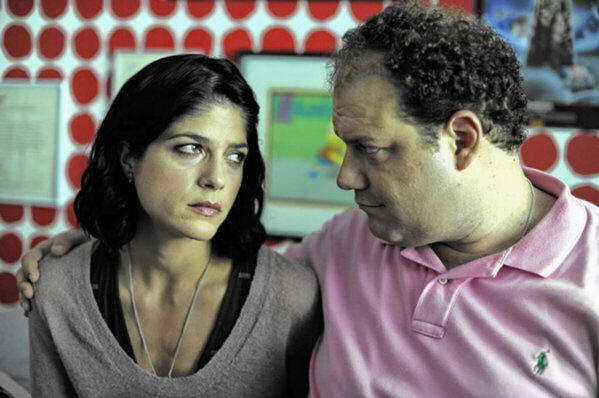MOVIE REVIEWS |
INTERVIEWS |
YOUTUBE |
NEWS
|
EDITORIALS | EVENTS |
AUDIO |
ESSAYS |
ARCHIVES |
CONTACT
|
PHOTOS |
COMING SOON|
EXAMINER.COM FILM ARTICLES
||HOME


Sunday, July 22, 2012
MOVIE REVIEW
Dark Horse
Opportunities And Fantasies For A Neo-Ralph Kramden

Selma Blair as Miranda and Jordan Gelber as Abe in Todd Solondz's tragicomedy
"Dark Horse".
Goldcrest/Brainstorm Media
by
Omar P.L. Moore/PopcornReel.com
 FOLLOW
FOLLOW
Sunday, July 22,
2012
Todd Solondz returns to the big
screen after "Life During Wartime" to direct "Dark Horse", a mellower but no
less penetrating tragicomedy about 35-year-old Abe (Jordan Gelber), an
overweight man living at home with his mother (Mia Farrow) and the father he
despises (an excellent deadpan Christopher Walken). Abe, a Long Island,
New Yorker, is trapped in the wrong era. He has the emotional age of a
teenager and drives an unsightly mustard colored Hummer-type vehicle that looks
like a life-size edition of a Matchbox car. Abe, who works in his father's
office, hasn't made use of his full potential, a fact his dad frequently reminds
him of, comparing Abe to his successful doctor brother (Justin Bartha of
"The
Hangover".)
In "Dark Horse", which opened in select U.S. cities over the weekend, Abe meets
the ailing, tentative Miranda (Selma Blair) and begins an awkward romance with
her. Miranda, displayed in the end credits affectionately as "formerly Vi"
(the name of Ms. Blair's character in the director's film "Storytelling"), is
the face of pain, showing the world she'd rather be anywhere else than with Abe.
Miranda's odd rapport with Abe is full of thinly-veiled sarcasm and comedy.
Ms. Blair is good here keeping her voice even as she initially equivocates her
feelings about Abe. Meanwhile, the only women who care about Abe are his
mother (Mia Farrow) and his office co-worker Marie, a self-styled "cougar" (a
terrific Donna Murphy, who in this film occasionally bears a striking likeness
to the actress Elizabeth Pena.)
Mr. Solondz, whose troubled characters are often mired in a state of solipsism
as well as extreme self-loathing, makes his players in "Dark Horse" stand out
amidst a bright, colorful canvas only reinforcing parody and the pain of
characters striving for self-improvement. "Dark Horse" may be more
restrained and less disturbing by the director's standards but its undercurrents
can be felt in its spare, surreal fantasy sequences. The episodes cut
deeper than one might expect given the fluid sketches of this quiet sitcom
featuring fine performances from everyone notably Mr. Gelber, who on screen
crafts a teddy bear-ish persona in Abe, a loner who is genuinely confident but
misunderstood. An ugly namechain hangs around Abe's large neck like an
albatross, symbolizing
"Dark Horse" is replete with bitter truths, most of which are delivered by Abe,
who in true Solondz tradition spouts furious invective and has bouts of
apoplectic rage. Abe, part neurotic, part hopeful, is not bound so much by
his ambition and confidence as held back by the expectations of those around
him. Abe's tense relationship with his dad highlights his own inertia but
galvanizes him to make a meaningful mark in life. In essence Abe is a
Ralph Kramden-type figure. He tells it like it is but his venom is
inwardly focused. He sounds like Jackie Gleason's immortal creation though
softer, more sensitive. Abe, a well-meaning sort wallowing in arrested
development, is surrounded in his bedroom by 1980s film and television show
figurine collectibles and verges on self-immolation so passionate is his anger.
Abe's desires overrun his reality. He's a palpable presence. You
feel for Abe, whether he's abrupt, impatient, brusque or lovable. The
director defies expectations somewhat with "Dark Horse", and it is a deeper,
better film than its apparent shallowness might suggest. Funny, despairing
and honest, "Dark Horse" has a tenderness and heart that is undiluted.
It's a film almost as weirdly cuddly as its lead figure, called a "dark horse"
by his scorning father. "Dark horse" means underdog or sleeper, the one
who sneaks up unsuspectingly to produce great things. In Mr. Solondz's
film it could be a term used for what is pejoratively called the "black sheep"
of the family. "Dark Horse" as a film sneaks up on you and it is a welcome
surprise.
In some ways "Dark Horse" is an ironic fairy tale of a talismanic figure of bad
luck. Mr. Solondz manages to convey unsettling undercurrent through eerie
sanguine moments and near trance-like dialogue. It's an accomplished
effort. You think that little is going on as you watch "Dark Horse", a
film of silences, flights of fancy and varying anxieties but it skillfully works
on you after it is over. "Dark Horse" has more air and breathing space
than past Solondz efforts, and aside from perhaps Noah Baumbach these days
there's no American independent feature filmmaker who chronicles pain, angst,
dysfunction and discomfort in human beings quite like Mr. Solondz does, getting
us to laugh, cringe and feel uncomfortable in the process.
Also with: Zachary Booth, Aasif Mandvi, Tyler Maynard, Mary Joy.
"Dark Horse" is not rated
by the Motion Picture Association Of America. It contains occasional harsh
language and sensuality. The film's
running time is one hour and 25 minutes.
COPYRIGHT 2012. POPCORNREEL.COM. ALL RIGHTS RESERVED.  FOLLOW
FOLLOW
MOVIE REVIEWS |
INTERVIEWS |
YOUTUBE |
NEWS
|
EDITORIALS | EVENTS |
AUDIO |
ESSAYS |
ARCHIVES |
CONTACT
| PHOTOS |
COMING SOON|
EXAMINER.COM FILM ARTICLES
||HOME


 FOLLOW
TWEET
FOLLOW
TWEET FOLLOW
FOLLOW